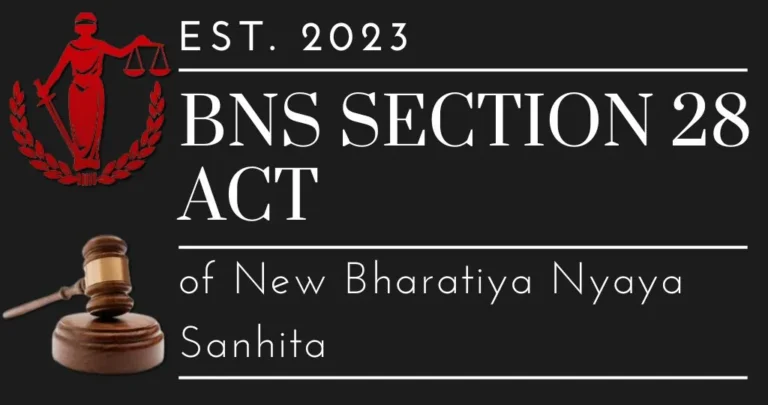
The Bharatiya Nagarik Suraksha Sanhita, 2023: Effects of Errors in Charges (Section 238) and Legal Interpretations in Charges (Section 237)
The Bharatiya Nagarik Suraksha Sanhita, 2023: Consequences of Errors in Charges (Section 238) and Interpretations of Law in Charges (Section 237)
The Bharatiya Nagarik Suraksha Sanhita, 2023 (BNSS) replaced the ancient Criminal Procedure Code to make legal processes easier and more clear-cut as well as ensure criminal trial proceedings are fair and transparent. Two very vital provisions of BNSS, Section 237 and Section 238, touch upon the presentation of charges in criminal cases. These sections deal with the language of charges and how charge errors can affect the case. All these sections are vital in maintaining the integrity of legal proceedings and safeguarding the rights of the accused. This article will discuss the importance of these sections in simple terms.
Section 237: Legal Interpretation of Words in Charges
For More Updates & Regular Notes Join Our Whats App Group (https://chat.whatsapp.com/DkucckgAEJbCtXwXr2yIt0) and Telegram Group ( https://t.me/legalmaestroeducators ) contact@legalmaestros.com.
Section 237 of the BNSS determines that the terms used to characterize an offense in a charge are understood in light of the definitions provided by law for the same offense. This is to avoid confusion or vagueness over the language of charges. Let’s see how it goes:
Legal Meaning of Words: Under Section 237, words in charges are not interpreted in a common sense but in the legal sense given to them by the concerned law. For instance, if a person is accused of “theft” in a charge sheet, the term “theft” is read precisely as it is defined in the Bharatiya Nyaya Sanhita (BNS), the law that defines criminal offenses in India. This leaves no scope for subjective or different meanings.
Standardized Vocabulary: Section 237 enables uniform interpretation of the legal vocabulary in cases to avoid misinterpretation or alleged misunderstandings. Because legal vocabulary has particular meanings, following their prescribed sense under the law eliminates confusion and ensures clarity throughout the legal process.
Application in Charges: This provision makes sure that the prosecution and defense both share a common understanding of terms used, upholding procedural fairness. The accused and the court can make direct reference to the legal meanings of terms, and everyone concerned has a clear idea of the charges.
Section 238: Effect of Charges Errors on Legal Proceedings
Section 238 of the BNSS is a realistic provision covering mistakes in charges, acknowledging that errors may occur in the intricacies of drafting legal papers. But this section stipulates clearly that not every mistake in a charge sheet is “material” or significant. Only those mistakes which mislead the accused or result in failure of justice are material. This emphasis on “material errors” enables the legal process not to be slowed down or entangled in issues over minor mistakes.
Key Provisions of Section 238 and Their Application
Section 238 provides guidance as to when a mistake in a charge sheet can be deemed to be material and when it would not be considered so. A summary of its key provisions follows:
Minor Errors Need Not Always Be Material: The subsection makes it clear that minor errors or discrepancies in charges do not necessarily collapse the legal process. A misdescription of the offense or a failure to include certain particulars does not necessarily interfere with the proceedings unless it prejudices the accused or affects the case itself. This is done to see to it that justice is upheld by centering on substance rather than procedure.
Effect on the Accused: For an error to qualify as material, it must have actually misled the accused. When an error or omission in the charge leaves the accused in doubt regarding the character of the charge, impairing their capacity to defend themselves appropriately, it qualifies as material. Otherwise, the error is regarded as immaterial, and the trial continues without having to correct the charge sheet.
Need for a Fair Trial: Section 238’s focus on materiality is in consonance with the values of a fair trial. It makes sure that the accused are not unduly prejudiced because of mistakes but also that such mistakes do not derail the judicial process if they have not led to any real harm or confusion to the accused.
Examples Demonstrating Section 238
To illustrate the realistic impact of Section 238, BNSS offers examples demonstrating how various charging errors could impact the accused and the trial.
Example (a): If A is charged under Section 180 of the BNS for being in possession of fake coins, but the omission of the word “fraudulently” occurs in the charge, the mistake is not material unless A was actually misled. If A grasped the allegation even in the absence of the word, the mistake would be considered immaterial.
Example (b): Where A is indicted for cheating B without specifying how the cheating was done but yet defends themselves to the fullest extent, the court might deem it an error without materiality. A’s defense implies that they were not deceived by the absence of detail in the charge.
Example (c): On the other hand, if A is charged with cheating B but the accusation is not specific, and A and B had more than one transaction, A could be in real confusion. If A was unable to find out which transaction was involved and hence did not make a defense, the court may consider this to be an error material since it misled the accused and affected his defense.
Example (d): Suppose A is accused of the murder of Khoda Baksh on January 21, 2023, but the victim was actually Haidar Baksh and the date was January 20, 2023. This difference would not be material if A knew the context of the case. In this case, A was not deceived because the investigation only pertained to Haidar Baksh’s murder.
Example (e): But if A is charged with the murder of Haidar Baksh and was tried for the murder of Khoda Baksh, A can be deceived by the mistake. This will be a material mistake since it has a very significant effect on A’s comprehension of the charge and preparation by the defense.
The Importance of Section 238 in Legal Practice
Section 238 is of great importance in making the judicial process efficient and just. By concentrating on whether material errors in charges prejudice the accused, this section avoids unnecessary delay on trivial technicalities, maintaining the substance of the case. It also protects the rights of the accused, making sure that they are not prejudiced by serious errors in charges.
Conclusion: Synthesizing Sections 237 and 238 towards Justice
The two Sections, 237 and 238, of the Bharatiya Nagarik Suraksha Sanhita, 2023, provide a well-balanced regime for dealing with charges in criminal cases. Section 237 elucidates that expressions in charges bear the precise meanings provided in law, so the accused and legal stakeholders have the same understanding of terms in charges. Section 238, on the contrary, takes a practical approach to dealing with errors, with the proviso that only those errors that mislead the accused or impede justice should be deemed material.
These provisions collectively uphold the equity and transparency of criminal processes and a more transparent and effective judicial system within the BNSS. Focusing on substantive justice and not procedural errors, these provisions ensure criminal trials are held fairly, respecting the accused’s rights while maintaining the integrity of the legal process.






